How to Sew a Pleated Skirt From Woven Fabric (PARADISE)

I was looking forward to using this fabric a lot! It is a woven fabric with viscose and elastane in beautiful ocher (mustard) color and it simply enchanted me. It’s flowing, wonderfully soft, and a bit elastic, so it is great for dresses, skirts, and blouses. I've been thinking for a long time about what skirt pattern to use to take advantage of all the properties of this great fabric. At the same time, I was looking for a less complex pattern, so as not to complicate the pattern matching. In the end, I decided to use my pattern for the pleated skirt PARADISE, which is relatively simple. The black waistband resembles leatherette (it's just shiny woven fabric) and together with the visible metal zipper creates a rascally impression. It reminds me of Dirty Dancing... Well, with this skirt, nobody will put you in the corner! ♥
The pattern
The pattern for women's skirt PARADISE is designed for knits, so I had to make a few simple adjustments so that I could use this elastic woven fabric. I photographed and described the sewing procedure (including the above-mentioned modifications) in this article. You can get the pattern I used here:
Women’s skirt PARADISE (sizes 32–60)
Recommended material
I recommend using light and medium knits (elastic materials), such as cotton knits, Ponte Roma knits, and light laid-in knits. I sewed the skirt with flower print (light single knit) exactly according to the pattern. I used elastic woven fabric (with viscose & elastane) for the yellow skirt. You can get this fabric here:
I used this shiny fabric (which looks like a leatherette) for the black waistband:
I bought both materials at the Dumlatek.cz store.
You will also need a zipper, which should be 14-16 cm (5.5"– 6.3") long.
Sewing instructions
First, select the correct size of the pattern. When sewing the original ↓ skirt (knit), I chose size 36 (which is my actual size according to the size chart).
For the skirt made of yellow woven fabric, however, I chose size 38 to make the skirt a little looser around the waist and hips. If you want to use a woven fabric without elastane or other elastic components, you can go two sizes up. You may need to shorten the waistband, which should be as long as the circumference of your waist + 3 cm (1.18").
Pattern layout
Prepare:
- 1x back piece (cut on the fold)
- 1x front piece (cut on the fold)
- 2x bottom hem
- 1x waistband
If you have decided to use inelastic materials, I highly recommend reinforcing the waistband with one-sided fusible interfacing. It should keep its shape even when worn frequently.
In order not to have to pattern match both side seams, I cut the front and back pieces as a single piece. One seam with which I will have to close the skirt will not be on the side but the back. So instead of two side seams, I have one rear center seam. The seam allowances of this seam are much wider than usual - about 4 cm on both sides. As a result, one column of squares will fit on each of them. Thanks to that I can be sure that I will be able to align print on both sides of the rear center seam. If I cut the piece exactly according to the marks in the pattern (with smaller seam allowances), it might not work out.
Mark the point in the middle of the front piece, you can use a small notch (cut) or tailor's chalk. Then also mark the quarters ("side seams").
Sewing
Now create pleats. After folding the pleats, the width of the piece should be approximately the same as the length of the waistband.
Make sure that the pleats are uniform and that they point away from the side seams.
When sewing the skirt with flowers I just folded the pleats and sewed the waistband right on top. But with this skirt, I needed the pleats to be more stable and pointed in the same direction as the columns of the print. I stabilized the pleats with about 4 cm (1 5/8 ") long vertical seams.
Then I pinned (and sewed) the waistband to the face side of the skirt. My waistband was quite elastic, so it didn't matter that it was a little shorter than the width of the skirt. When sewing, I stretched the waistband and sewed it evenly to the skirt.
I let the skirt overlap the waistband by about 2 cm (3/4") on both sides.
I used a straight stitch, but if you want to add more elasticity, or you're afraid that your skirt will be too tight, then you can also use an elastic stitch.
Now place the skirt face side up and fold the waistband in half (lengthwise, face side in).
Mark the fold with a pin or a small notch.
Place the zipper next to the mark and fold the zipper tape back on itself.
Pin the zipper to the waistband and skirt (face side to face side).
Sew the first half of the zipper to the skirt. Sew the other side of the zipper in the same way.
Then sew the rear center seam.
This seam should be about 2-3 mm (0.08–0.12") closer to the cutting edge than the zipper seam.
Clean the cutting edges of both seam allowances and press them open.
Fold the seam allowances of the waistband above the zipper...
...and upper seam allowance to the reverse side of the waistband. Then fold the entire waistband in half (lengthwise, face side out) and pin its edge to the waistline of the skirt.
If you want, you can use temporary stitching instead of pins, as I did. Don't forget to also attach the shorter sides of the waistband (near the zipper).
Topstitch the bottom edge of the waistband and pull out the temporary stitching.
Fold the bottom hem of the skirt in half (face side in) and sew the shorter sides.
Press the seam allowances open and fold (roll) the hem in half (lengthwise, face side out).
Pin the hem to the bottom edge of the skirt (face side to face side).
Sew the hem to the skirt.
Clean the seam (and pull free ends of the thread chain under the loops when using your overlock).
Don’t forget to iron your new skirt.
And that's it! Your skirt is ready, you can wear it year-round. :)
You can explore the skirt pattern I used in this tutorial here:
Women’s skirt PARADISE (sizes 32–60)
Don't forget to share your joy with others!
Do you like this article? If so, share it with your friends and tell me about it in the comments section below. I will be glad for any feedback! ♥
PS: Did you know that there are FREE PATTERNS available on my blog?
Enjoyed the project?
The author may collect a small share of sales from the links on this page.

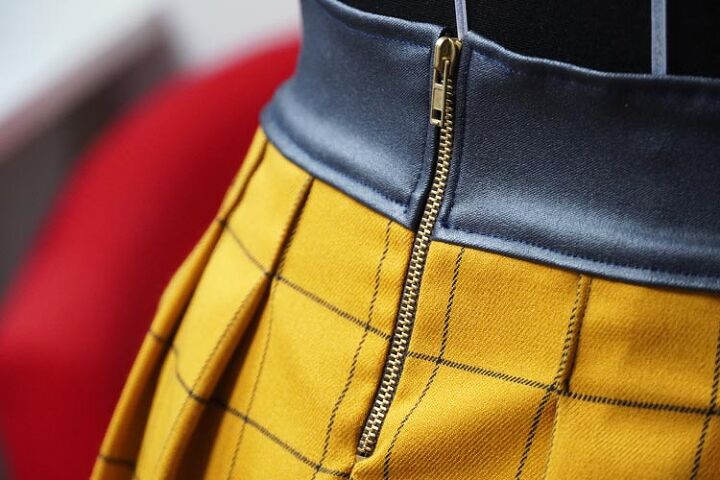































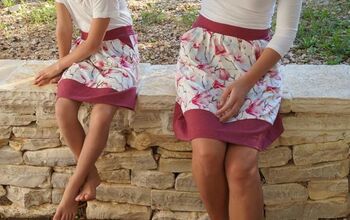
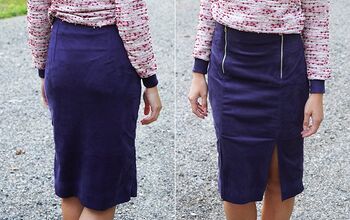
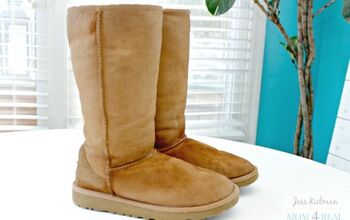
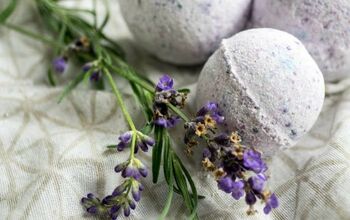

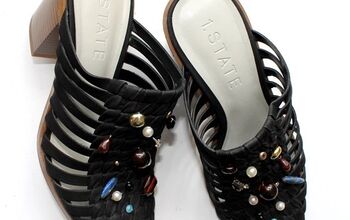

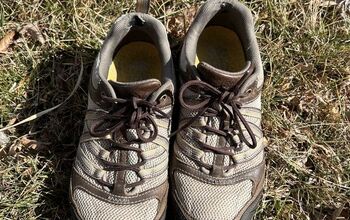
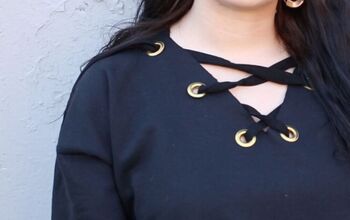

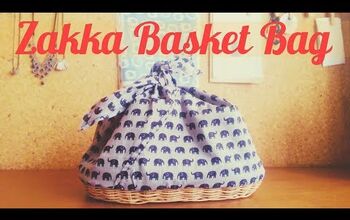
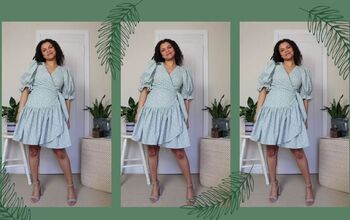
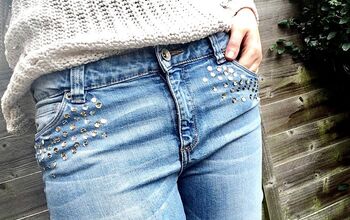
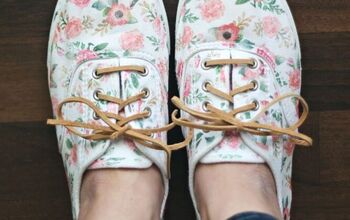

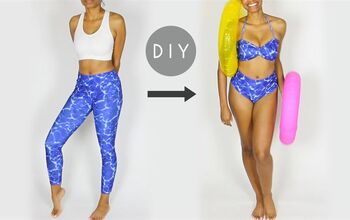
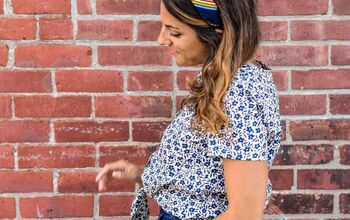
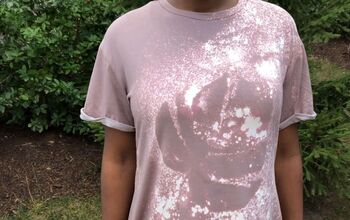
Comments
Join the conversation